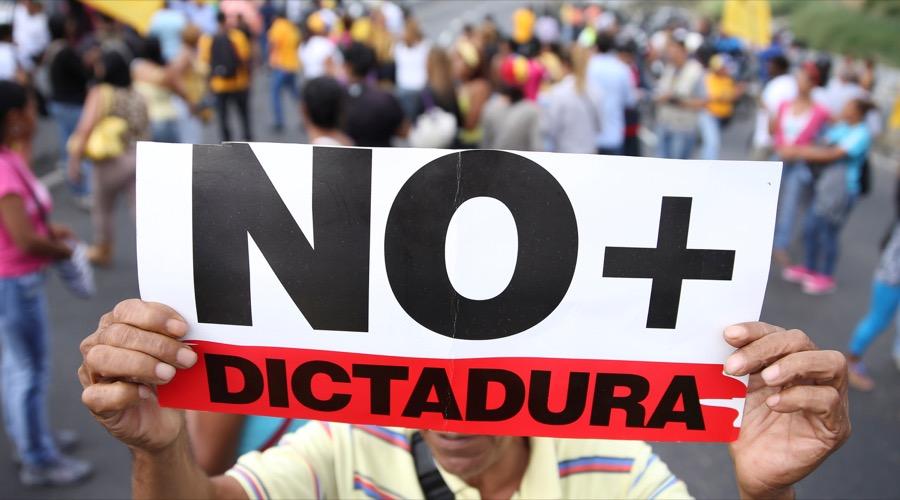Venezuela’s political crisis just got even worse
Opposition supporters hold a placard that reads "No more dictatorship" and shout slogans as they block a highway during a protest against Venezuelan President Nicolas Maduro's government in Caracas, Venezuela on March 31.
International powers are voicing alarm at Venezuela after its Supreme Court seized power from the legislature on Thursday, a move widely viewed as handing greater authority to President Nicolas Maduro.
Now, even a member of the president's own inner circle is crying foul. The South American country's attorney general surprisingly broke ranks on Friday with Maduro, condemning recent the court rulings as a "rupture of constitutional order."
Attorney General Luisa Ortega is the first high-level official in Venezuela to criticize court rulings this week that effectively dissolved the opposition-majority legislature and revoked lawmakers' immunity from prosecution.
The rulings "show evidence of various violations of the constitutional order and ignorance of the state model established in our constitution," Ortega said live on state television at an event to mark the release of her 2016 annual report.
It was a shocking departure from script for Venezuelan state TV, where the programming is strictly pro-government and Maduro often delivers long speeches or shows off his salsa dancing.
"It is my duty to inform my country of my deep concern over these events," said Ortega, drawing a long salvo of applause from the crowd.
Ortega was long seen as a loyalist of the socialist "revolution" launched by Maduro's mentor Hugo Chávez in 1999.
But with once-booming oil giant Venezuela now mired in food shortages, political chaos and an epidemic of violent crime, she fired some of the most severe public criticism yet from within the president's own camp.
She delivered her remarks while brandishing a copy of what she referred to as "Chávez's constitution," adopted the year the late leftist firebrand came to power.
Crisis talks, protests
Street protests erupted for a second day Friday in Caracas. Students marched on the Supreme Court, where they scuffled with soldiers.
Protesters calling for early elections also blocked streets in the working-class Petare neighborhood, and opposition lawmakers clashed with Maduro supporters downtown.
On Thursday, protesting lawmakers scuffled with riot police outside the Supreme Court.
International condemnation continued pouring in, adding to the criticism already voiced by the United States, the European Union and a host of Latin American countries.
Colombia recalled its ambassador to Venezuela, while Spanish Prime Minister Mariano Rajoy said on Twitter that "when you break the division of powers, you break democracy."
UN High Commissioner for Human Rights Zeid Ra'ad Al Hussein warned Venezuela: "The separation of powers is essential for democracy to function."
The head of the Organization of American States called for the regional group's permanent council to hold crisis talks on the situation.
South American regional bloc Mercosur — which suspended Venezuela in December — will also hold crisis talks Saturday, Argentina announced.
Venezuela's center-right opposition has meanwhile called for more street protests Saturday.
The criticism came two days after the Supreme Court, which has staunchly backed Maduro through an economic and political crisis, assumed the powers of the National Assembly.
The legislature was the only pillar of power that was not under the control of the president and his allies.
On Tuesday, the court also cleared the way for opposition lawmakers to be prosecuted for what Maduro calls treason.
Critics have accused the court of staging a coup.
Venezuela rejected that accusation Friday, lashing out at its critics as "imperialists."
Power struggle
The Supreme Court ruled the National Assembly leadership was in contempt of court for swearing in three lawmakers who were banned over alleged electoral fraud.
The opposition Democratic Unity Roundtable condemns the fraud charges as a trumped-up bid to curb the party's power after it won a landslide in legislative elections in December 2015 with a promise to oust Maduro.
The court has overturned every law passed by the new legislature.
Its expansion of its own powers came as part of a ruling on an oil law, enabling the government to launch joint ventures with private oil companies without legislative approval.
Venezuela has the world's biggest oil reserves, but the collapse in prices has sapped its revenues, prompting shortages of food, medicine and basic goods.
Maduro, who was elected to succeed Chávez in 2013, is not up for re-election until October 2018.
But his popularity has plunged amid the crisis, forcing him to fend off opposition efforts to call a referendum on removing him from power.
By AFP's Alexander Martinez.
Our coverage reaches millions each week, but only a small fraction of listeners contribute to sustain our program. We still need 224 more people to donate $100 or $10/monthly to unlock our $67,000 match. Will you help us get there today?
